- Home
- Elizabeth George
The Edge of the Light
The Edge of the Light Read online
VIKING
An imprint of Penguin Random House, LLC
375 Hudson Street
New York, New York 10014
First published in the United States of America by Viking, an imprint of Penguin Random House LLC, 2016
Copyright © 2016 by Susan Elizabeth George
Penguin supports copyright. Copyright fuels creativity, encourages diverse voices, promotes free speech, and creates a vibrant culture. Thank you for buying an authorized edition of this book and for complying with copyright laws by not reproducing, scanning, or distributing any part of it in any form without permission. You are supporting writers and allowing Penguin to continue to publish books for every reader.
eBook ISBN 9780698169739
LIBRARY OF CONGRESS CATALOGING-IN-PUBLICATION DATA
Names: George, Elizabeth, date– author.
Title: The edge of the light / by Elizabeth George.
Description: New York : Viking Books, published by Penguin Group, [2016] |
Sequel to: The edge of the shadows. | Summary: “In the final book of the Whidbey Island saga, events build to an astonishing climax as secrets are revealed, hearts are broken, and lives are changed forever”—Provided by publisher.
Identifiers: LCCN 2015044545 | ISBN 9780670012992 (hardback)
Subjects: | CYAC: Mystery and detective stories. | Secrets—Fiction. |
Whidbey Island (Wash.)—Fiction. | BISAC: JUVENILE FICTION / Mysteries & Detective Stories. | JUVENILE FICTION / Law & Crime.
Classification: LCC PZ7.G29315 Ee 2016 | DDC [Fic]—dc23 LC record available at https://lccn.loc.gov/2015044545
Version_1
In loving memory of GA
Contents
Title Page
Copyright
Dedication
Epigraph
Chapter 1
Chapter 2
Chapter 3
Chapter 4
Chapter 5
Chapter 6
Chapter 7
Chapter 8
Chapter 9
Chapter 10
Chapter 11
Chapter 12
Chapter 13
Chapter 14
Chapter 15
Chapter 16
Chapter 17
Chapter 18
Chapter 19
Chapter 20
Chapter 21
Chapter 22
Chapter 23
Chapter 24
Chapter 25
Chapter 26
Chapter 27
Chapter 28
Chapter 29
Chapter 30
Chapter 31
Chapter 32
Chapter 33
Chapter 34
Chapter 35
Chapter 36
Chapter 37
Chapter 38
Chapter 39
Chapter 40
Chapter 41
Chapter 42
Chapter 43
Chapter 44
Chapter 45
Chapter 46
But this swift business
I must uneasy make, lest too light winning
Make the prize light.
—WILLIAM SHAKESPEARE,
THE TEMPEST
1
Hospitals were bad, but rehab centers were worse. In a hospital, rotten stuff that happened to people at least got dealt with pronto and you ended up knowing what the outcome was going to be. You had a car wreck, you got carted to Emergency, you got patched up or operated on, you lived, or you died. It all took time, but the time ended. In a rehab center, though, everything went on and on. Especially if you had a stroke.
That was what Seth Darrow was thinking as he watched his grandfather in one of the physical therapy rooms at Penn Cove Care, which was situated on a leafy side street in the old Victorian town of Coupeville on Whidbey Island. Seth and his dad had just engaged in a depressing meeting with the head of PT, a woman who’d spent twenty-five years in the military and who had a way of speaking that pretty much showed it. The news they’d been given had matched the weather outside, which was wintertime bleak with a sky pouring down a fifteenth straight day of steady rain accompanied by the occasional wind gust that was taking down aged alders and lofty Douglas firs across the island.
“Mr. Darrow still isn’t working with us,” she announced to Seth and his dad ten seconds after they’d sat in front of her desk. Her name plate called her G. H. FIELDSTONE, and she’d introduced herself as George. Then she’d added doctor in front of it, just in case they’d considered getting friendly. “This has to change,” she said. “This is a rehab facility, with the accent on rehab. If Mr. Darrow doesn’t make more progress . . .” She did one of those lifting of the fingers routines, which meant they were to fill in the blanks. She looked severely at Seth’s dad, Rich. It seemed she thought he was thick as a board because she added, “This isn’t a permanent living facility. You understand.”
She then suggested that they have a look for themselves from the hallway outside of the PT room where Ralph Darrow was working with the occupational therapist. That was what they were doing at the moment, and Seth’s heart thudded painfully as he watched his grandfather.
It had been more than four weeks since the stroke that had robbed Ralph Darrow of speech and the ability to use his right arm. His right leg had been affected, too, but not as badly as his arm. He’d more or less got back the use of the leg, which was the good news, although he was still unsteady. But when it came to the arm, he was toast. The damage was done, the arm was finito, and what he had to do was learn how to be left handed. He also had to learn how to use his left hand to exercise his right arm so that he didn’t develop something called contractures. If that happened, his right arm’s muscles would totally freeze up as the muscles thickened.
So once he got steadier on his feet, Ralph had PT sessions for his arm several times a day. He also had speech therapy sessions twice a day to handle the loss of language. The situation Ralph was in would’ve been a bummer for anyone, but for Seth’s grandfather, who for the last fifty-two of his seventy-three years had been a carpenter, a gardener, and a forester who maintained well over one hundred acres of woodland, it was like a death blow.
Seth’s insides ached as he watched his granddad. He shot a look at his father and saw that Rich Darrow felt the same. The occupational therapist was presenting Ralph with exercises that involved using his left hand to lift his useless right hand to the height of his shoulder, but once the therapist did it for him in demonstration, Ralph did nothing to show that he understood.
Seth’s father said, “He’s not even trying,” as his cell phone rang. He pulled it from his pocket, gave it a look, said, “It’s your mom” to Seth and then into the phone, “Hi, sweetheart. You doing okay?” Rich listened for a moment and, for his part, Seth strained to hear. His mom said something to which his dad replied, “You don’t need to go so long without a pill, Amy. It’s not like you’re going to get addicted. . . . What’re you going to do with them, sell them? . . . Don’t be stubborn. Take a pill, get some rest, and we’ll be home soon. . . . No. It’s not looking good. We’ll talk when Seth and I get back.” He listened for a second, said, “Will do. Love you,” and ended the call. He said to Seth, “Your mom loves you, she said.”
“Back at her.” Seth nodded at his granddad, who was still sitting lifelessly in front of the therapist. “What do we do now?”
Rich settled his shoulders. “We ta
lk to him.”
“But if he doesn’t understand . . . ?”
“Oh, you can bet he understands,” Rich said. “Underneath it all, he’s still Ralph Darrow. I guarantee you, he understands.”
• • •
SETH WASN’T SURE. It seemed to him that if his granddad understood that the key to getting back home was showing everyone that he was capable of reacquiring speech and also capable of learning to use his left hand and arm in place of his right one, then Ralph would throw himself into these tasks. He wouldn’t spend weeks just sitting there.
The speech therapist would show him picture cards representing words like cat, hat, bat. She would say the words that went with the cards. But all that came from Ralph in return was a dull-eyed look at what was being flashed in front of him.
The occupational therapist would present him with blocks of various shapes to manipulate into holes by means of his left hand, and he’d just let his left hand fall to his lap. Seth had said more than once that his granddad wasn’t like this man who slumped in a chair and did not respond. Grand was filled with life and joy and wisdom, and right now he just didn't understand what was going on. Somehow none of the medical people had made a breakthrough with him.
Seth followed his father into the PT room. They stood out of Ralph’s line of vision until the end of the session with the occupational therapist. At that point, the therapist stood and said—as cheerfully as possible, considering the lack of cooperation from the patient—“That’s enough for today. Let’s get you back to your room.” That was when Rich and Seth stepped forward.
Rich said to the therapist, “We’ll take him from here, if that’s okay,” and the tone that he used communicated something more than just helping her out.
She said to Ralph, “Mr. Darrow, I’m leaving you in the hands of your son and grandson,” which got Ralph’s attention. He turned his head and, in doing so, confirmed what Rich had been declaring: When Ralph wanted to understand something, he understood completely. The therapist patted Ralph’s shoulder, said to him, “Don’t you get into trouble,” and she left them.
Rich went around to the front of Ralph’s wheelchair. He set the brake and said to his father, “Let’s see how you’re doing with walking back to your room. Seth, you take the chair. Dad, I’m helping you up.”
Ralph stiffened. Rich said to his father, “You know what’s going on, and it’s time to stop pretending you don’t. Here’s the deal, Dad: If you don’t improve, Brenda wins. So what you’ve got to ask yourself is whether you want that to happen.”
• • •
BRENDA WAS BRENDA Sloan. She was Seth’s aunt and Rich Darrow’s younger sister, and she had buckets of money and the will to use it. She lived in the upscale community of Medina east of Seattle and across Lake Washington, where her husband made megabucks dealing in high end real estate and Brenda had a successful business staging homes prior to putting them on the market. That is, she staged homes when she wasn’t getting involved in Ralph Darrow’s health and welfare, which had become her primary obsession about twenty-four hours after Ralph’s stroke.
That was when she’d shown up on the island and made the declaration that Ralph “obviously” could no longer live on his own. The fact that he’d had a stroke while alone and had not been discovered till some hours later indicated to her that he was destined for assisted living.
That Ralph Darrow did not live alone was something that didn’t impress Brenda Sloan. For he shared his house with a teenaged girl who traded housecleaning and cooking for her room and board. This child, Brenda announced, hadn’t been present when the stroke occurred. That indicated what the future would be if Ralph was allowed to return to his home.
“He’ll have another stroke, she won’t be there, and he’ll die,” was Brenda’s repeated refrain. “Do you want that, Rich?”
No one wanted that, but no one aside from Brenda wanted Ralph to have to leave his home.
2
In Deception Pass State Park, the weather was milder. While the rain had been coming down in great waving sheets in Coupeville at the center of Whidbey, in the north part of the island the day was wet, but not wet enough to cancel a hike.
No one worth his salt in the Pacific Northwest would have been put off by rain, anyway. A change of gear was all it took, along with using more care on the park’s trails. But on one particular trail, hikers were largely protected from the weather. For despite the elevation gain, most of the path carved its way beneath some of the greatest trees of the park: hemlocks that loomed like skyscrapers, Douglas firs that shed small cones everywhere, fragrant cedars, madrones gracefully stretching their bark-peeling branches above the forest floor. All of these formed a canopy through which only the most severe rainfall could pierce. True, there were boulders for hikers to contend with along the way, and they could be slick, but the three individuals on the trail weren’t bothered by this.
Becca King—sixteen years old—was one of the hikers. The second was her boyfriend Derric. The third was fifteen-year-old Rejoice Ayoka, and Becca had sensed from the moment when she and Derric had picked the girl up for this hike that Rejoice wasn’t happy. Before this, eighteen-year-old Derric had always driven to La Conner alone to see Rejoice, which was no problem as far as Becca was concerned. For although she and Derric were a couple, he shared a past and a heritage with the younger girl: They were both Ugandan, and they had both been adopted out of the same orphanage in Kampala. There were other parts of the Derric-and-Rejoice relationship, too. But Derric had not yet mentioned them to Rejoice, and Becca wasn’t about to say a word in reference to them, either.
Now they were approaching the final section of the trail. The going was trickier, with a sharp descent down a bluff followed by a jump onto a path that edged a raindrop-speckled and winter-bleak expanse of water called Cornet Bay. Derric went first to break the fall should either of the girls slip, and when he reached the bottom and made the leap onto the path below, he turned to help the girls.
Becca was cautious. She’d been concentrating on more than just her footwork. She’d also been working hard to keep her mind as perfect a blank as possible. Empty of all there is was a mantra she was using to achieve this blank. She’d been repeating it silently since leaving Derric’s car, and only when there was conversation among them had she allowed anything else to enter her head.
Becca was full of the mantra when she heard Derric saying, “Hey, don’t do it that way, Rejoice!” in a tone of alarm. She roused herself to see that the other girl was poised to jump down to the lower path, arms extended behind her, as if she intended to fly.
“He’s right,” Becca said to the fifteen-year-old. “Don’t, Rejoice!”
But Rejoice didn’t appear interested in either of their warnings because she laughed and called out, “Catch me, Derric!” and flung herself off her perch in his direction.
Derric scrambled, saying, “That’s a dumb-ass thing to—” but he managed to catch her, although both of them ended up on their butts in the mud. Rejoice laughed as Derric began struggling onto his feet.
“I knew you could do it!” She clapped, as if applauding the boy’s heroics on her behalf.
Derric looked at Becca, and she heard him perfectly. What she thinks about it came to her as clearly as if he’d spoken although he’d not said a single word.
She wanted to reply. She told herself what she would have said had Derric only known that she could hear what was going on in his head: “It’s not what I think. It’s what Rejoice is thinking. You better watch out.” But she said nothing. Instead, she smiled at him as he came back over to the final jump and helped her down.
“Ooooh, Becca was too scared to jump,” Rejoice said airily.
Derric replied with, “Becca was too smart to jump. You, on the other hand, could’ve broken a leg.”
“No way,” Rejoice countered. “I knew you’d take care of me.”
Although the path was now virtually flat as it skirted Cornet Bay and led in the direction of the Deception Pass Bridge and the roiling waters beneath it, Rejoice appeared to have considerable trouble staying upright. “Way too slippery!” was how she explained it as she grabbed for Derric’s support time and again. “Can you help me, Derric?” became a constant refrain.
Derric maintained his cool. He was, as far as Becca was concerned, the personification of patience with the younger girl. It had been a number of weeks since Becca had taken him to La Conner to meet Rejoice, and it was obvious that he considered it too early to do anything more than just hang with her when he was able to make the drive. Talking to her honestly did not seem to be something that was going to happen any time soon.
The trouble with this was how Rejoice was interpreting Derric’s visits. Becca had had her suspicions about this when the girl’s calls to Derric’s cell phone began to come more than three times a day. So when Derric had invited Becca to join them on this particular hike, Becca had said “sure,” because she wanted to be exactly that: sure about what was happening with Rejoice.
Back at Derric’s car, they stowed their gear and the remains of the snacks they’d taken with them. Rejoice called out, “Shotgun!” and over her shoulder said to Becca, “It is my regular place, you know,” and clambered inside the car.
Derric muttered, “Sorry, babe,” as he shut the cargo area of the Forester.
“No problem,” she said, and added, “but we should probably talk, you and me.”
He didn’t reply. She’d gone back to Empty of all there is for the remainder of their walk, so she didn’t hear anything else from him. She climbed into the car and told herself that the prospect of studying the back of Derric’s dark, shaven skull wasn’t so bad anyway. He had gorgeous skin the color of bitter chocolate, and from her angle behind the passenger seat, she could see the smooth curve of his cheek and the muscle in his jaw that moved when he was feeling something he hoped not to reveal.

 Well-Schooled in Murder
Well-Schooled in Murder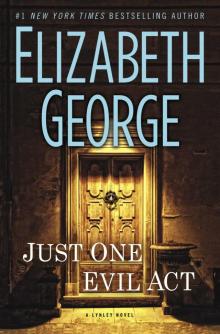 Just One Evil Act
Just One Evil Act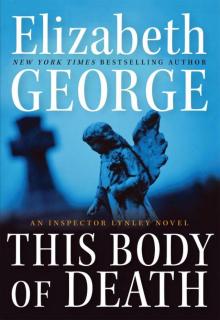 This Body of Death
This Body of Death The Edge of the Water
The Edge of the Water For the Sake of Elena
For the Sake of Elena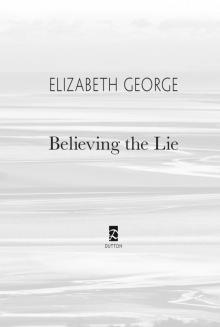 Believing the Lie
Believing the Lie The Edge of the Shadows
The Edge of the Shadows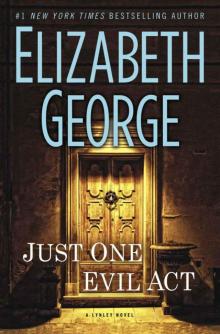 Just One Evil Act: A Lynley Novel
Just One Evil Act: A Lynley Novel In Pursuit of the Proper Sinner
In Pursuit of the Proper Sinner A Moment on the Edge:100 Years of Crime Stories by women
A Moment on the Edge:100 Years of Crime Stories by women Elizabeth I
Elizabeth I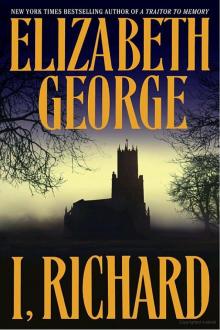 I, Richard
I, Richard A Traitor to Memory
A Traitor to Memory Missing Joseph
Missing Joseph A Suitable Vengeance
A Suitable Vengeance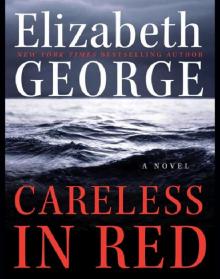 Careless in Red
Careless in Red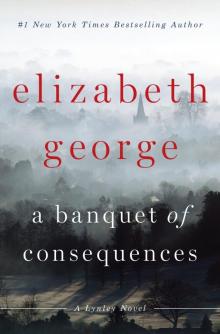 A Banquet of Consequences
A Banquet of Consequences Playing for the Ashes
Playing for the Ashes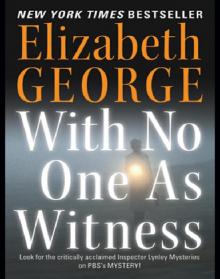 With No One As Witness
With No One As Witness Deception on His Mind
Deception on His Mind The Best American Mystery Stories 2016
The Best American Mystery Stories 2016 A Great Deliverance
A Great Deliverance In the Presence of the Enemy
In the Presence of the Enemy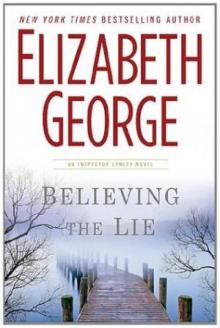 Believing the Lie il-17
Believing the Lie il-17 The Edge of the Light
The Edge of the Light SW01 - The Edge of Nowhere
SW01 - The Edge of Nowhere A Place of Hiding
A Place of Hiding What Came Before He Shot Her il-14
What Came Before He Shot Her il-14 Payment In Blood
Payment In Blood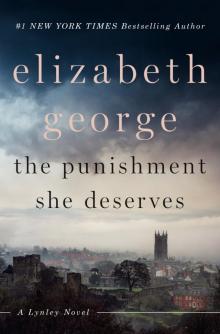 The Punishment She Deserves
The Punishment She Deserves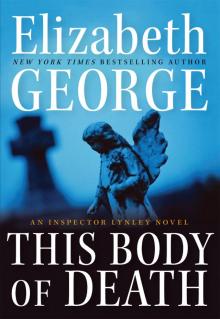 This Body of Death: An Inspector Lynley Novel
This Body of Death: An Inspector Lynley Novel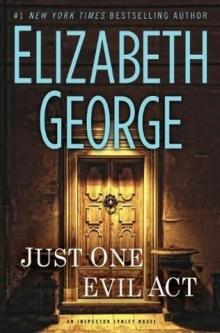 Just One Evil Act il-18
Just One Evil Act il-18 What Came Before He Shot Her
What Came Before He Shot Her Missing Joseph il-6
Missing Joseph il-6